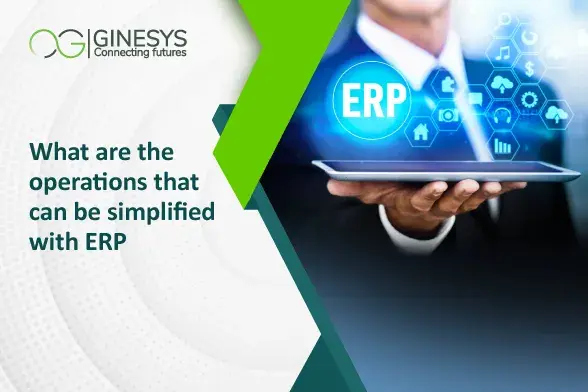What are the operations that can be simplified with ERP
The biggest problems retailers encounter are related to rising costs, wasted time, and poor allocation of resources. With the use of ERP software, these challenges can be overcome with ease. Enterprise Resource Planning (ERP) software can be a great way to reduce lead times, improve quality, give better customer service, reduce costs and in turn, improve profit margins.
There is no doubt that ERP software is expensive, but the right software combined with careful planning of business operations can make it very cost-effective. The benefits of ERP largely outweigh the costs associated with it. This is why an ERP system can be a valuable investment for businesses looking to jump to a higher level of efficiency. Here are some ways in which it can simplify your operations.

Waste management
ERP solutions document your workflow so you can discover what's slowing down your day-to-day operations and develop strategies to increase efficiency in those areas. In addition, ERP data analysis can help you maximize warehouse space, save on setup time, and manage material delivery timings - all of which can have a significant impact on your company's productivity.
Continuous improvement
ERP systems keep track of workflows in real-time. The resultant workflow data can be analyzed once the modifications to processes have been completed. There is always space for improvement in terms of waste reduction and profit generation. It isn't entirely up to you to do the analysis. An ERP can help with such an analysis as well to help you improve your business processes.
Simplifying customer service
Customer satisfaction is critical to your company's success. ERP software allows you to integrate Customer Relationship Management (CRM) capabilities into the ERP system. For instance, synchronizing workflow across various departments, including inventory, manufacturing, accounting, and shipping can help streamline the order management process, accelerating order fulfillment. Customers may also follow the status of their orders through integrated tracking via the ERP. All this leads to enhanced customer satisfaction.
Streamline the ordering process
Based on product demand, your ERP system can notify your team of what production, supply, and inventory demands they have. This reduces the need for specific departments to manage and maintain supplies, allowing for a smooth and continuous flow of activity.
Improving collaboration

Collaboration is an important aspect of a business. Almost every ERP includes electronic collaboration tools and advanced planning software to assist you in getting what you need when you need it. Electronic communications can standardize your business by producing purchase orders, tracking shipments, issuing invoices, and more - from suppliers to distributors and distributors to consumers. An integrated ERP system includes chat, forum, and other quick communication capabilities out of the box, enabling your company to collaborate more proactively.
Easier cost-cutting
An ERP solution lowers costs without sacrificing product quality, making it a more practical, effective, efficient, and, most importantly, a long-term solution to cost optimization. In addition, an ERP system is adaptable and its capabilities may be altered at any point to include more features that help reduce cost. Along with this, with access to real-time information, decision-making gets faster and better, allowing businesses to save time and money by making the right cost-sensitive decision at the right time.
Data security and regulatory compliance
Financial reporting requirements, as well as governmental and industry-specific data security rules, change often. An ERP can help businesses stay secure and compliant. By recording the lifespan of each transaction, including adherence to mandated approval protocols, an ERP offers an audit trail. In addition, automation can help businesses decrease the risk of mistakes and related regulatory issues. ERP software also helps generate financial reports that adhere to industry standards and regulations.
Reporting and analytics
Data is only meaningful if firms can analyze and comprehend it, which is something that an ERP can help with. Leading systems include powerful reporting and analytics features that allow users to present any metrics or comparisons they can think of, in addition to tracking KPIs. An ERP is all-encompassing, it can assist a firm in determining how a change in a process in one department impacts the rest of the organization.
Risk management
ERP technology helps to control risk in a variety of ways. Financial controls can be strengthened and fraud can be reduced via granular access control and established approval routines. Moreover, accurate data prevents mistakes that might lead to missed sales targets or regulatory fines. Finally, personnel can swiftly deal with hazards created by business disruptions since they can monitor the state of the entire operation in real-time.
Streamline your business process with Ginesys
There are multiple software vendors out there who promise the world with their business solutions. However, not all of them can help an organization in every area of the business. With Ginesys, you get an ERP vendor with a legacy of helping businesses across different niches like FMCG, fashion, and retail who helps you in simplifying core business processes.Get in touch with us to start your ERP implementation journey.

